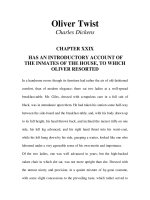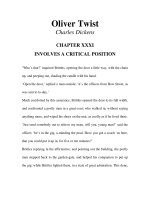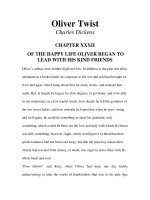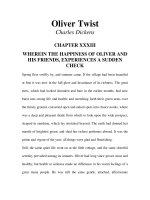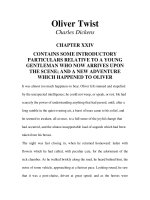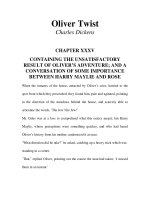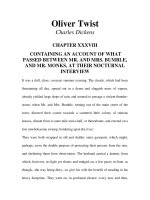Tài liệu LUYỆN ĐỌC TIẾNG ANH QUA TÁC PHẨM VĂN HỌC-Pride and Prejudice -Jane Austen -Chapter 40 ppt
Bạn đang xem bản rút gọn của tài liệu. Xem và tải ngay bản đầy đủ của tài liệu tại đây (21.61 KB, 8 trang )
Pride and Prejudice
Jane Austen
Chapter 40
Elizabeth’s impatience to acquaint Jane with what had happened could no
longer be overcome; and at length, resolving to suppress every particular in
which her sister was concerned, and preparing her to be surprised, she
related to her the next morning the chief of the scene between Mr. Darcy and
herself.
Miss Bennet’s astonishment was soon lessened by the strong sisterly
partiality which made any admiration of Elizabeth appear perfectly natural;
and all surprise was shortly lost in other feelings. She was sorry that Mr.
Darcy should have delivered his sentiments in a manner so little suited to
recommend them; but still more was she grieved for the unhappiness which
her sister’s refusal must have given him.
‘His being so sure of succeeding was wrong,’ said she, ‘and certainly ought
not to have appeared; but consider how much it must increase his
disappointment!’
‘Indeed,’ replied Elizabeth, ‘I am heartily sorry for him; but he has other
feelings, which will probably soon drive away his regard for me. You do not
blame me, however, for refusing him?’
Blame you! Oh, no.’
‘But you blame me for having spoken so warmly of Wickham?’
‘No—I do not know that you were wrong in saying what you did.’
‘But you WILL know it, when I tell you what happened the very next day.’
She then spoke of the letter, repeating the whole of its contents as far as they
concerned George Wickham. What a stroke was this for poor Jane! who
would willingly have gone through the world without believing that so much
wickedness existed in the whole race of mankind, as was here collected in
one individual. Nor was Darcy’s vindication, though grateful to her feelings,
capable of consoling her for such discovery. Most earnestly did she labour to
prove the probability of error, and seek to clear the one without involving
the other.
‘This will not do,’ said Elizabeth; ‘you never will be able to make both of
them good for anything. Take your choice, but you must be satisfied with
only one. There is but such a quantity of merit between them; just enough to
make one good sort of man; and of late it has been shifting about pretty
much. For my part, I am inclined to believe it all Darcy’s; but you shall do
as you choose.’
It was some time, however, before a smile could be extorted from Jane.
‘I do not know when I have been more shocked,’ said she. ‘Wickham so
very bad! It is almost past belief. And poor Mr. Darcy! Dear Lizzy, only
consider what he must have suffered. Such a disappointment! and with the
knowledge of your ill opinion, too! and having to relate such a thing of his
sister! It is really too distressing. I am sure you must feel it so.’
‘Oh! no, my regret and compassion are all done away by seeing you so full
of both. I know you will do him such ample justice, that I am growing every
moment more unconcerned and indifferent. Your profusion makes me
saving; and if you lament over him much longer, my heart will be as light as
a feather.’
‘Poor Wickham! there is such an expression of goodness in his countenance!
such an openness and gentleness in his manner!’
‘There certainly was some great mismanagement in the education of those
two young men. One has got all the goodness, and the other all the
appearance of it.’
‘I never thought Mr. Darcy so deficient in the APPEARANCE of it as you
used to do.’
And yet I meant to be uncommonly clever in taking so decided a dislike to
him, without any reason. It is such a spur to one’s genius, such an opening
for wit, to have a dislike of that kind. One may be continually abusive
without saying anything just; but one cannot always be laughing at a man
without now and then stumbling on something witty.’
‘Lizzy, when you first read that letter, I am sure you could not treat the
matter as you do now.’
‘Indeed, I could not. I was uncomfortable enough, I may say unhappy. And
with no one to speak to about what I felt, no Jane to comfort me and say that
I had not been so very weak and vain and nonsensical as I knew I had! Oh!
how I wanted you!’
‘How unfortunate that you should have used such very strong expressions in
speaking of Wickham to Mr. Darcy, for now they DO appear wholly
undeserved.’
‘Certainly. But the misfortune of speaking with bitterness is a most natural
consequence of the prejudices I had been encouraging. There is one point on
which I want your advice. I want to be told whether I ought, or ought not, to
make our acquaintances in general understand Wickham’s character.’
Miss Bennet paused a little, and then replied, ‘Surely there can be no
occasion for exposing him so dreadfully. What is your opinion?’
‘That it ought not to be attempted. Mr. Darcy has not authorised me to make
his communication public. On the contrary, every particular relative to his
sister was meant to be kept as much as possible to myself; and if I endeavour
to undeceive people as to the rest of his conduct, who will believe me? The
general prejudice against Mr. Darcy is so violent, that it would be the death
of half the good people in Meryton to attempt to place him in an amiable
light. I am not equal to it. Wickham will soon be gone; and therefore it will
not signify to anyone here what he really is. Some time hence it will be all
found out, and then we may laugh at their stupidity in not knowing it before.
At present I will say nothing about it.’
‘You are quite right. To have his errors made public might ruin him for ever.
He is now, perhaps, sorry for what he has done, and anxious to re-establish a
character. We must not make him desperate.’
The tumult of Elizabeth’s mind was allayed by this conversation. She had
got rid of two of the secrets which had weighed on her for a fortnight, and
was certain of a willing listener in Jane, whenever she might wish to talk
again of either. But there was still something lurking behind, of which
prudence forbade the disclosure. She dared not relate the other half of Mr.
Darcy’s letter, nor explain to her sister how sincerely she had been valued by
her friend. Here was knowledge in which no one could partake; and she was

